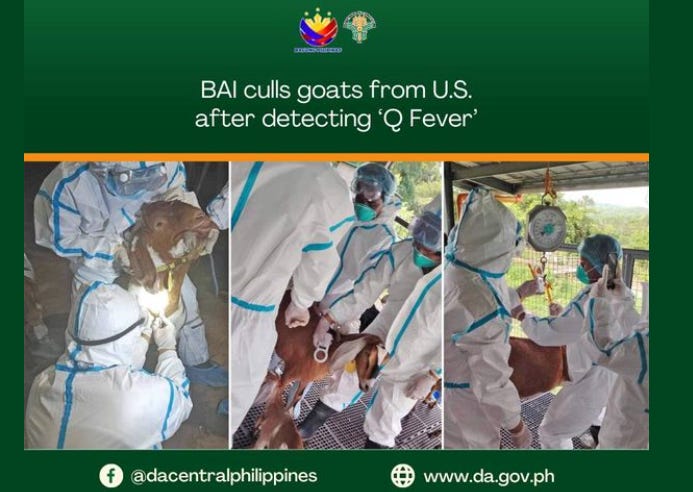The Bureau of Animal Industry (BAI) on Friday depopulated more than five dozen goats imported from the U.S. following the detection of Q fever among some of the animals at a government breeding station in Marinduque.
The goats were bought for a dispersal program to farmers. BAI confirmed the Q fever – a zoonotic disease caused by the bacteria Coxiella burnetii – after conducting PCR (polymerase chain reaction) tests on blood samples from suspected cases, with results of confirmatory tests released late Wednesday.
Upon receiving information of the PCR test results, Agriculture Secretary Francisco P. Tiu Laurel, Jr. ordered the immediate condemnation of all infected goats and animals exposed to the infected ruminants; the tracing of potentially infected animals; and a temporary ban on the importation of goats from the U.S. He also ordered the preventive suspension of certain BAI personnel pending investigation, a review of BAI’s quarantine and disease control protocols, and potential blacklisting of the importer of the infected goats.
The Department of Health (DOH) assures the public that a thorough assessment of risks to human health are underway.
Q fever is caused by the obligate intracellular pathogen, Coxiella burnetii. The disease is usually transmitted to people through either infected milk or through aerosols.
This disease is found on most continents with the reported incidence probably much lower than the actual because so many cases are so mild.
Animal reservoirs of C. burnetii include sheep, cattle, goats, dogs and cats. In areas where these animals are present, Q fever affects veterinarians, meatpacking workers, and farmers.
Subscribe to Outbreak News TV on YouTube
The symptoms of Q fever according to the CDC are an unexplained febrile illness, sometimes accompanied by pneumonia and/or hepatitis is the most common clinical presentation. Illness onset typically occurs within 2–3 weeks after exposure.
The DOH advises the public to avoid contact with animals suspected to have Q fever.
If exposure is suspected, please consult with the nearest hospital or clinic. Q fever can be treated with antibiotics that are widely available in the Philippines- doxycycline and hydroxychloroquine for several months.





